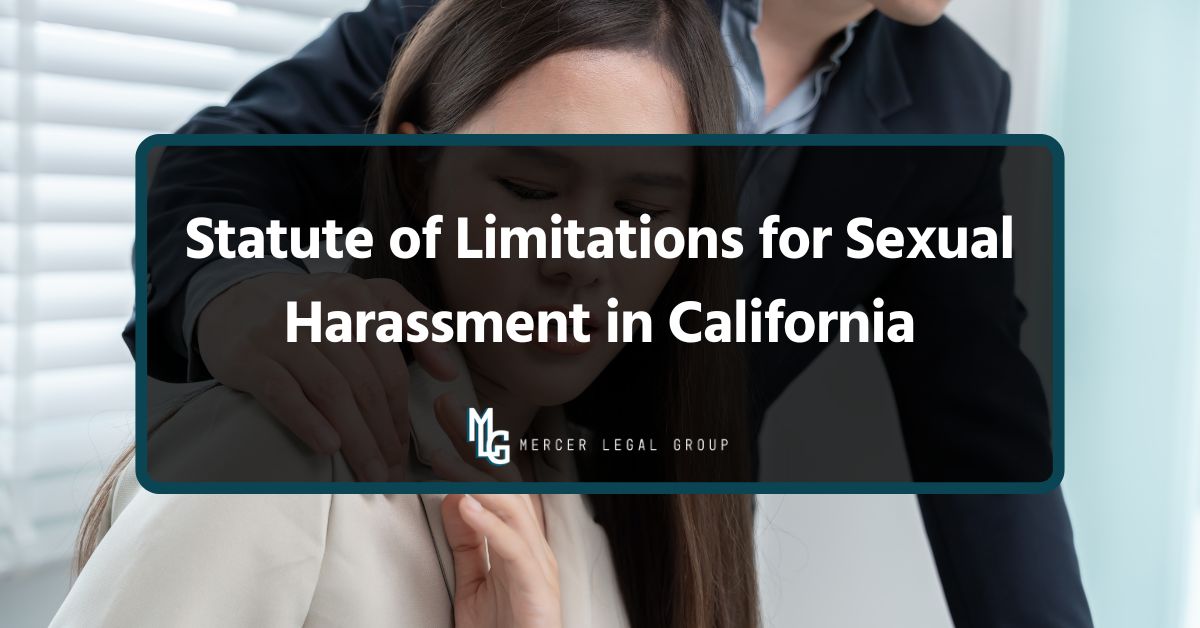Workplaces, schools, or other settings can give rise to sexual harassment cases when a person experiences unwanted conduct that creates a hostile environment. The statute of limitations for sexual harassment in California is generally three years from the date of the last incident. However, other legal claims related to harassment may have different deadlines, so it’s important to seek legal guidance promptly.
At Mercer Legal Group, our attorneys have a track record of guiding numerous clients through sexual harassment cases, offering empathetic support and strategic legal advice. With years of experience handling claims involving hostile work environments, retaliation, and harassment, we understand the complexities of the law and how to protect your rights. Our team is dedicated to building strong cases that give our clients the best chance at justice and accountability. Contact us today for a confidential consultation and let our skilled attorneys fight for the outcome you deserve.
This article breaks down the statute of limitations for sexual harassment claims, including the filing deadline, factors that could change the timeline, and what to do if you’re thinking about legal action.
Understanding Sexual Harassment Under California Law

Sexual harassment in the workplace occurs when unwelcome conduct based on sex, gender, or sexual orientation creates an intimidating, hostile, or offensive environment. Under California law, sexual harassment includes verbal comments, unwanted touching, requests for sexual favors (quid pro quo), and behavior that disrupts an employee’s ability to work effectively.
A hostile work environment can develop from repeated jokes, remarks, or actions that go beyond simple teasing, while quid pro quo harassment happens when job benefits or promotions are tied to sexual favors. Such conduct not only undermines workplace professionalism but also places victims in unfair and harmful situations.
Federal law, under Title VII of the Civil Rights Act, prohibits sexual harassment. However, California’s Fair Employment and Housing Act (FEHA) provides broader protections. Unlike federal law, California does not require the harassment to be “severe or pervasive” for a claim to be valid. Under state laws, any unwelcome conduct based on sex can be actionable if it creates an abusive work environment. This stronger standard helps protect employees in California by giving them more ways to hold employers accountable for workplace misconduct.
What Is the Statute of Limitations for Sexual Harassment in California?
The statute of limitations is the legal time frame within which a person must file a claim, and it plays a critical role in ensuring fairness in legal cases. These deadlines are important because waiting too long to take action can result in losing the right to pursue justice, regardless of the strength of the claim. In the context of sexual harassment, the statute of limitations helps balance timely resolution with the need to allow those affected space to come forward.
While sexual harassment statutes vary depending on the jurisdiction, California offers broader protections for those impacted by workplace harassment compared to many other states. Under the Fair Employment and Housing Act (FEHA), individuals generally have three years from the date of the last incident of harassment to file a complaint with the Civil Rights Department (formerly DFEH).
After filing with the department and receiving a right-to-sue notice, affected individuals can pursue their case in court, making it essential to act promptly within the state’s deadlines. If you miss these timelines, the court may dismiss your case, regardless of its validity or the harm suffered.
What Is the Statute of Limitations for Filing a Claim?
In California, the statute of limitations for filing a workplace sexual harassment claim generally gives victims three years from the date of the last incident to file a complaint with the Civil Rights Department (CRD), formerly known as the Department of Fair Employment and Housing. Once a complaint is filed and a right-to-sue notice is issued, individuals can then take their case to civil court.
Recent legislative changes have expanded protections for victims. In 2019, California passed AB 9, also called the Stop Harassment and Reporting Extension (SHARE) Act, which extended the filing deadline for victims of sexual harassment from one year to three years. This change gave those affected more time to identify the harm, collect evidence, and take action without concern about missing deadlines.
It’s also important to note that timelines can differ depending on the circumstances, such as claims involving retaliation, filing an EEOC charge, or overlapping federal complaints with the EEOC. Because these variations can complicate the process, consulting with an attorney ensures you understand which deadlines apply to your case and that you file your claim within the correct timeframe.
Workplace Sexual Harassment Claims (California Civil Rights Department – CRD/DFEH)

In California, workplace sexual harassment claims fall under the authority of the Civil Rights Department (CRD), formerly known as the Department of Fair Employment and Housing (DFEH). As of 2020, victims have three years from the last incident to file a claim, giving them more time to recognize the harm and take legal action.
These claims often involve issues of sex discrimination, where employees face unfair treatment or harassment based on gender, and can lead to remedies such as lost wages, emotional distress compensation, and even punitive damages in serious cases.
California law also emphasizes prevention, requiring sexual harassment prevention training for many employer-based organizations to reduce the risk of harassment in the workplace. While prevention is a key focus, the law ensures that employees who experience harassment still have strong protections and clear avenues to pursue justice through the CRD.
What Are the Federal EEOC Deadlines?
When filing a sexual harassment claim with the Equal Employment Opportunity Commission (EEOC), the deadline is generally 180 days from the date of the incident, but this period extends to 300 days if a state or local agency, such as California’s Civil Rights Department (CRD), also enforces anti-discrimination laws against workplace harassment.
The difference exists because the EEOC coordinates with local and state agencies to avoid overlap, giving victims in certain jurisdictions more time to file while still ensuring claims are handled efficiently.
How Has the #MeToo Movement Impacted the Statute of Limitations?
The #MeToo movement brought widespread attention to the challenges that ongoing harassment face when coming forward about sexual harassment and assault, especially the barriers created by short filing deadlines. As a result, lawmakers recognized the need for more time, leading to reforms like California’s AB 9 (the SHARE Act), which extended the statute of limitations for workplace harassment claims from one year to three years.
Beyond California, several states have extended statutes of limitations in response to #MeToo advocacy efforts. For example, New York significantly expanded its time frames for filing sexual harassment claims, and other states have considered or passed similar measures to give survivors greater access to justice. This trend shows how social movements can directly shape laws to better protect victims and hold perpetrators accountable.
How Long Do You Have to Sue in Court?

Before you can file a charge in court for sexual harassment in California, you must first file a complaint with the California Civil Rights Department (CRD) or the Equal Employment Opportunity Commission (EEOC). These agencies investigate claims and, once the process is complete, can issue a “Right-to-Sue” letter that permits you to proceed with a civil lawsuit.
After receiving a Right-to-Sue notice, you typically have one year to file your case in civil court. Missing this deadline can result in your case being dismissed, so it’s crucial to act promptly and work with an attorney who can help you prepare and file your lawsuit on time.
What Happens if You Miss the Deadline?
Missing the statute of limitations deadline can severely limit your legal options in a sexual harassment case. If you fail to file a claim with the California Civil Rights Department (CRD) or an EEOC charge within the required time frame, your complaint may be rejected outright, leaving you unable to pursue further administrative remedies.
In addition, if you attempt to file a lawsuit after the deadline has passed, the court will likely dismiss your case regardless of its merits. These risks highlight the importance of acting quickly, keeping track of all filing deadlines, and consulting an experienced attorney to ensure your rights are protected from the start.
Are There Exceptions to the Statute of Limitations?
In some cases, exceptions to the harassment statute of limitations can extend the time a victim has to file a sexual harassment lawsuit. One common example is the delayed discovery rule, which applies when a victim does not immediately realize that the behavior they experienced was harassment. In these situations, the deadline for legal recourse may begin once the victim becomes aware or reasonably should have become aware of the sexual harassment and its impact.
Special circumstances may also apply in cases involving minors or retaliation claims. When the victim is under 18, the statute of limitations often does not begin running until they reach the age of majority, ensuring that young victims are not unfairly barred from seeking justice. In retaliation cases, where an employer punishes an employee for making a sexual harassment complaint, the timeline for filing may be linked to the occurrence of the retaliatory act itself, giving victims additional time to pursue their rights.
Another important concept is tolling, which effectively pauses the statute of limitations under certain conditions. Tolling may occur if the victim is unable to take legal action due to incapacity, ongoing internal investigations, or other legally recognized reasons. These exceptions ensure that strict filing deadlines do not unfairly prevent victims from holding harassers and employers accountable when circumstances delay their ability to act.
Steps to Take if You Experience Sexual Harassment in California
If you experience sexual harassment in California, the first step is to carefully document each occurrence. Write down dates, times, locations, what was said or done, and the names of any witnesses. Keeping clear records strengthens your case and provides evidence if you decide to file a complaint later.
Next, report the harassment internally by notifying your supervisor or human resources or following your company’s reporting procedures. If the issue isn’t resolved, you can file a complaint with the California Civil Rights Department (CRD) or the Equal Employment Opportunity Commission (EEOC), which investigates workplace harassment claims. Finally, it’s crucial to speak with an experienced sexual harassment lawyer, who can explain your rights, ensure deadlines are met, and help you pursue the best legal strategy for your situation.
How Can an Attorney Help With Sexual Harassment Claims?

Having an attorney on your side can make a major difference in sexual harassment cases, as they understand the law and know how to protect your human rights. Legal representation ensures you have someone to guide you through the legal process, gather evidence, and build a strong case against your employer or harasser.
One of the biggest advantages of working with an attorney is their ability to keep track of strict filing deadlines. They make sure your claim is filed within the statute of limitations so you don’t lose your right to take legal action. This is especially important in California, where timelines can vary depending on the type of claim.
At firms like Mercer Legal Group, experienced attorneys provide services such as investigating claims, negotiating settlements, and representing clients in civil court, as well as standing in for those who have faced sexual assault in state courts. They fight for fair outcomes that address damages like lost wages and emotional distress, while offering compassionate support that gives you confidence and peace of mind throughout the process.
Protect Your Rights Against Sexual Harassment in California
Understanding the statute of limitations for sexual harassment is essential, as these deadlines directly affect your ability to pursue justice and compensation. Acting within the legal timeframe preserves your rights and strengthens your case by ensuring evidence and witness accounts remain fresh. Regardless of its merits, waiting too long can lead to the termination of your claim.
If you believe you’ve been a victim of sexual harassment, it’s critical to act quickly and seek the right guidance. Consulting with an experienced attorney can help you navigate complex timelines, file the necessary complaints, and ensure no deadlines are missed, giving you the best possible chance of holding the responsible parties accountable.
Are you unsure how long you have to take legal action for sexual harassment in California? At Mercer Legal Group, our seasoned sexual harassment lawyers bring years of experience and a proven record of handling numerous harassment cases with skill and care. We combine in-depth legal knowledge with a client-focused approach to help you navigate strict filing deadlines and pursue justice. Reach out to us today for a free consultation and take the first step toward protecting your rights.
FAQ
Understanding the statute of limitations for sexual harassment claims is crucial, as strict deadlines determine how long you have to take legal action. Below are answers to common questions that can help you navigate your options and protect your rights.
How Long Do You Have to Press Charges for Harassment?
The time limit to press charges for harassment depends on the laws in your jurisdiction, as each state or province sets its own statute of limitations. In most cases, you may only have one to three years from the date of the incident to file charges, so acting quickly is important.
At What Point Can You Sue Someone for Harassment?
You can sue someone for harassment when their conduct goes beyond minor conflicts and creates significant emotional, psychological, or financial harm. To succeed, you must usually show a pattern of behavior, evidence of damages, and that the harassment violated civil or employment laws.
What Is the 6-Year Statute of Limitations in California?
In California, the 6-year statute of limitations typically applies to legal actions involving written contracts, meaning you have six years from the date of the breach to file a lawsuit. This time frame ensures parties have a fair opportunity to resolve disputes while preventing very old claims from being pursued.




